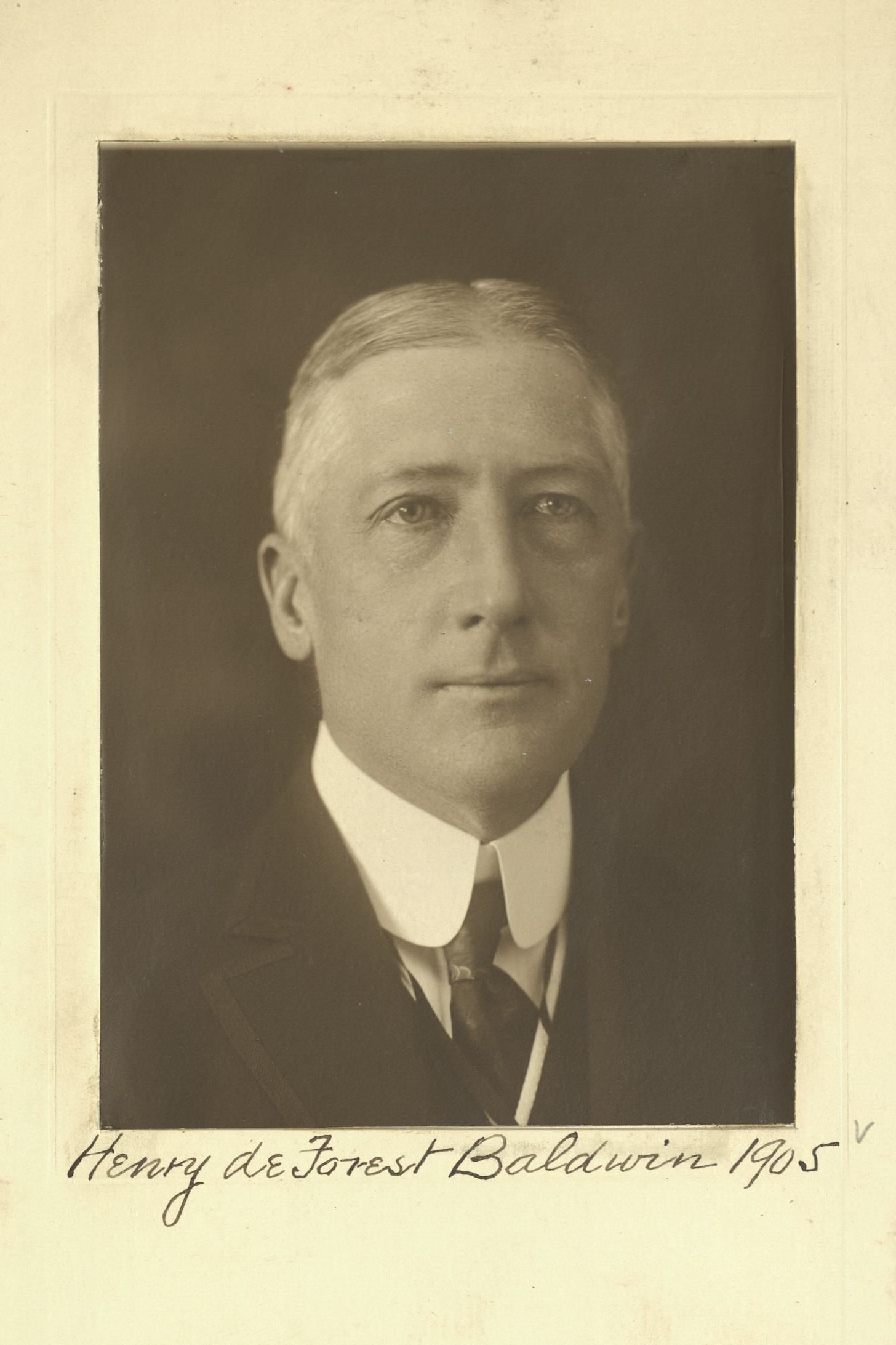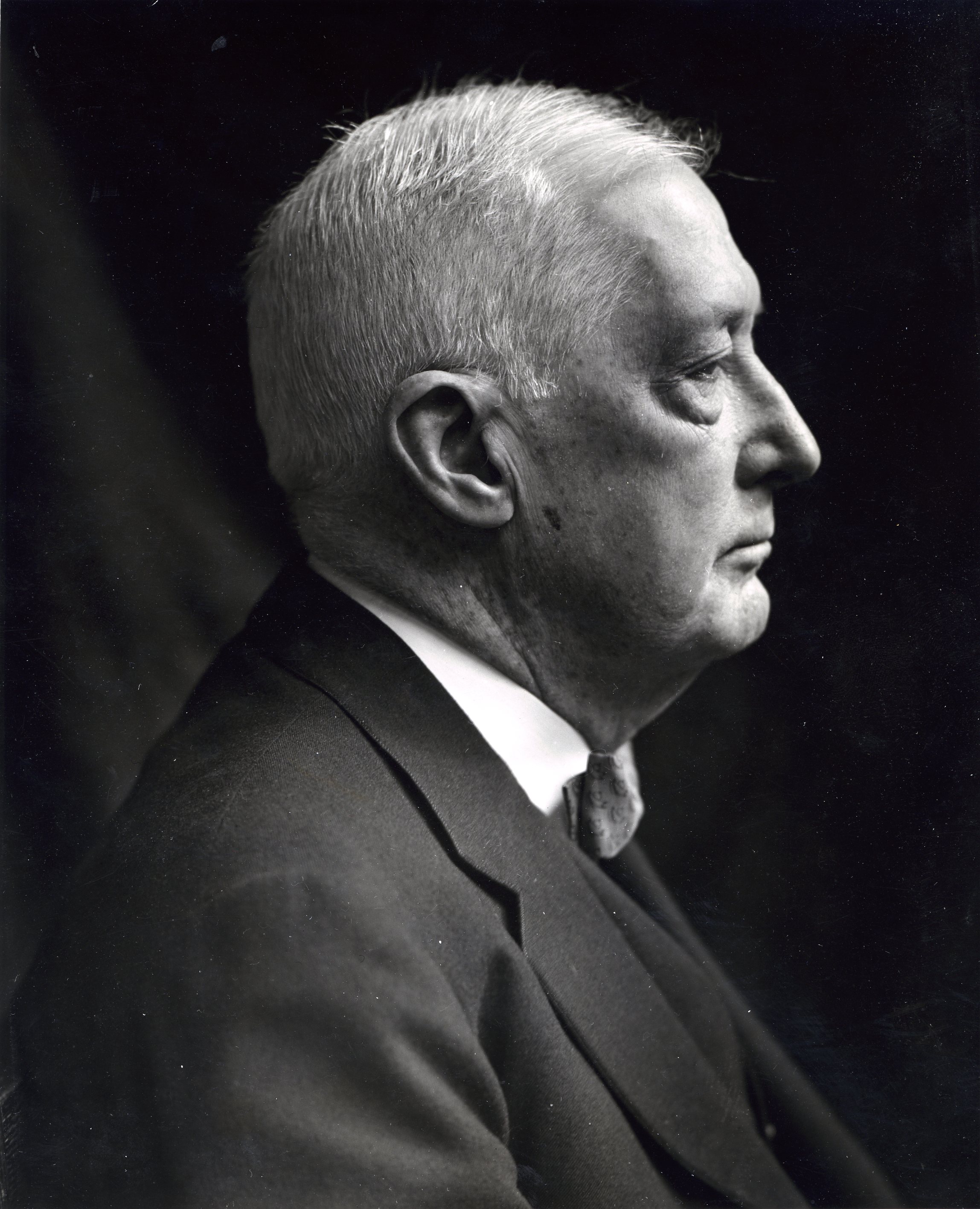Lawyer
Centurion, 1905–1947
Born 7 November 1862 in Clinton, Iowa
Died 18 May 1947 in New York (Manhattan), New York
Buried Woodlawn Cemetery , Bronx, New York
, Bronx, New York
Proposed by Henry Loomis Nelson and Charles C. Burlingham
Elected 1 April 1905 at age forty-two
Archivist’s Note: Second vice president of the Century Association, 1945–1947; treasurer, 1916–1944. Brother of Roger S. Baldwin; father of Sherman Baldwin; grandfather of Henry de Forest Baldwin
Seconder of:
Century Memorial
Henry deForest Baldwin. [Born] 1862. Lawyer.
Treasurer of the Century for twenty-nine years, the longest period of office-holding in the hundred years of our history, Second Vice-President for two, a Trustee for three more, member of the Stim Committee from its beginnings, member of the Investment Committee, Chairman of our Centennial Building Committee, pegged in forever with a golden peg on our membership board, and, nemine contradicente, the best man in the Club.
Better men than I, in this place, have told us of Mr. Baldwin: Charles Burlingham, Geoffrey Parsons, George Alger, Irving Brock, Leonard Bacon. There is nothing left for me to say; but the best man of all has said nothing.
Hence, I propose to read from what Mr. Baldwin himself said of himself in a short autobiography which he wrote for his children, for which I am indebted to his son Sherman [Baldwin], one of us.
My purpose in these memorials is to reveal character, and if I can, sharply delineated character. I think you will agree that these fragments delineate Mr. Baldwin. I ask you to listen and to remember that this is Mr. Baldwin speaking. I want to try to make you hear him again: to feel our priceless heritage of his bedrock common sense, the soul of his kindness and the pattern of his courtesy.
This is his statement of faith:
“Why am I at peace outside of any religious communion? Why am I indifferent to theological speculations? Because I do believe in some kind of a creed, which I might formulate differently at different times and which I have never attempted to formulate. It has been enough to be at peace through believing it. . . .
“Human institutions—political, religious, domestic—are created by mankind. They have no sanctions other than those which men and women are able to impose. Gods and ghosts are concepts created by men: they are words which have different meanings in different times and places.
“I have what church members call faith—probably not different in character from their faith. But I prefer to express my beliefs by words different from theirs. . . .
“I have by inheritance the ‘dissenting mind.’ I do not need a priest or a church. . . . I accept the Christian morals, as I interpret them; but I do not like the ecclesiastical organizations. As I expressed myself when I was twenty-five—I believe in the principles of the Democratic party, but I do not approve of Tammany Hall—so I am a Christian, but I do not approve of the organization. . . .”
For those of you, like me, who have a son, that you sometimes wonder about, I commend the following to your thoughtful consideration; for if Mr. Baldwin could have been like this, isn’t it right that all youngsters should be like this?
“During the period when I was preparing for college, I resented what as I look back upon it seemed to me at that time to be a tendency on the part of any father and mother to snub me and to sneer at my ideas as silly and unwarranted. They had no intellectual sympathy with me. I believe I was often rude or at least ostentatiously reserved and uncommunicative. My manner toward them both was probably at times offensive and hard. I felt they had no sympathy with any thoughts or ambitions—so I drew myself in my shell and ran ay life without explanations and without seeking their guidance. . . .”
And then consider these reflections on the rearing of children, written for his Yale classmates:
“Raising children causes endless perplexity. I am not a psychologist, nor a farmer, and am not competent to obtain the returns some do in treating them as specimens. I feel bound to regard them as fellow creatures. If I seek to improve them, I realize they would be less than human if they did not resent it in one way and another, at least to the extent of being under certain constraint when I am present: while if I do not exercise discipline, I have the prospect of turning out a worthless product. . . . In old times fathers claimed and usually received a deference which, while it forbade the building up of any close sympathetic friendship with their children, made discipline easy. But it is the fashion now to look upon children as important, because they are supposed to be more corrigible and to contain more possibilities, than their parents; and this attitude children have been quick to appreciate, with the result that the old deference is no longer to be remarked, while the loss is not often made good by closer sympathy and friendship.”
In the Century we are what we are everywhere else, and so was Mr. Baldwin. What I have read you from what he said of himself, apart from this Association, shows him here. We all know what he was here although no words of mine, or of anybody else, except perhaps his own, have yet succeeded in putting it into words. As Leonard Bacon wrote:
“. . . words obscurely show
A tenth of what you were and what you gave.
We had the luck to know.”
Source: Henry Allen Moe Papers, Mss.B.M722. Reproduced by permission of American Philosophical Society Library & Museum, Philadelphia
Henry Allen Moe
Henry Allen Moe Papers, 1947 Memorials


